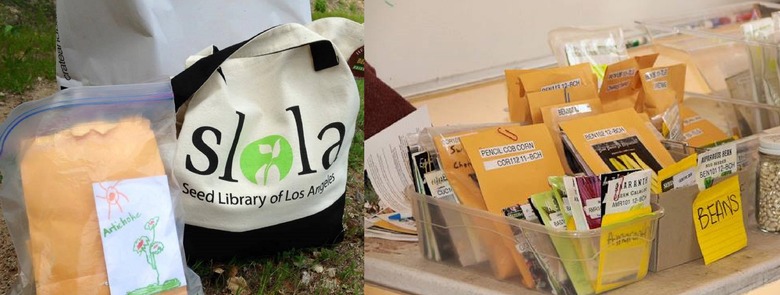These Libraries Lend Out Seeds Instead Of (Or In Addition To) Books
At more than 200 seed libraries across America, visitors are checking out something other than books and music. Seed libraries lend out fruit, vegetable, and flower seeds in tiny packets for visitors to take home and grow — and once the plants are mature enough to harvest and cull seeds from, each borrower brings back a new packet of seeds for someone else to plant.
The first-ever seed library of this kind was founded in California in 2000 by Sascha DuBrul. Called the Bay Area Seed Interchange Library (BASIL), based at the Ecology Center in Berkeley, the library's impressive success inspired others to found systems of their own. Museums, colleges, and nonprofits all began hosting seed libraries, and the seed-swapping systems soon grew into an impactful trend.
Speaker and activist David King founded the Seed Library of Los Angeles — currently headquartered at Venice High School — for fairly political reasons.
"A friend told me in 2009 I should start a seed library because it would go well with the other programs I offered in gardening," King told The Daily Meal, "but I decided it was too much work."
In 2010, however, he changed his mind — largely in response to the government's decision to allow more GMO plants for food.
"I became very angry," King recalled, "So to do something tangible to fight back, I asked people in Los Angeles if they wanted a seed library. And they did!"
Now, the Seed Library of Los Angeles is the largest such institution in America, lending seeds to over 1,600 members. They aim to "build a seed collection and repository, educate members about the practice of seed-saving, and create a local community of seed-saving gardeners," according to their website.
Some seed libraries have started to sprout as additions to actual public libraries, as well. In Tucson, Arizona, the Pima County Public Library has a thriving seed library. The Brandon Free Public Library in the Vermont town of Brandon features drawers upon drawers of easy-to-plant seeds ready for borrowing.
Since 2014, the Phoenix Public Library has been working to integrate this idea into its more traditional programs. South-central Phoenix is a food desert — an area where good-quality fresh food, such as fruits and vegetables, is especially expensive and difficult to find. Food deserts are typically located in impoverished areas, according to the American Nutrition Association, and have dangerous implications for public health. The library system is attempting to combat this issue and offer its visitors easy and affordable access to fresh produce — by helping them to grown their own.
Any library card holder can visit a participating branch and take home seeds to grow flowers and food. No matter a library patron's income level or background, the seeds are free — so long as he or she brings more seeds back in return.
"Phoenix Public Library's Seed Library gives our customers access to the knowledge, tools, resources and expertise that allows them to ultimately grow their own food," Lee Franklin, community relations manager for the library, told The Daily Meal. "Connecting our communities with information that helps them pursue life-long learning is Phoenix Public Library's primary mission. It makes sense for us to encompass the services of a Seed Library."
They started lending seeds in 2014 at the Harmon branch in the Central City South neighborhood and immediately experienced a high demand for the program. "They love it!" Franklin gushed. "In the three-plus years since we launched Seed Library at Harmon, we have brought our Seed Library to eight additional Phoenix Public Library locations."
In 2017, visitors checked out nearly 16,000 seed packets. When they check out seeds, visitors are encouraged to read books about gardening, sustainability, and environmental conservation.
Regardless of the motivations that brought each seed library to fruition, these institutions have succeeded at creating a thriving community of gardeners.
"We saw a way to strengthen our community's capacity to be self-reliant," Lee Franklin said of Phoenix Public Library's program. "Now, we have a deeper day-to-day relationship with our customers and their families."
Through the seed library, Phoenix is expanding residents' access to fresh produce, offering them the resources to make healthy, delicious recipes to feed their families — with their own crops.
